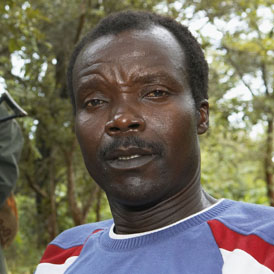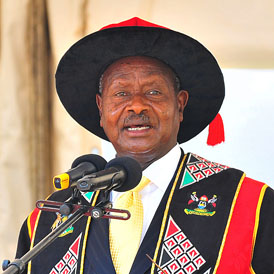‘Kony 2012 video could be damaging for Uganda’
An internet video campaign calling for the arrest of Lords Resistance Army leader Joseph Kony has been viewed 30 million times. Critics have branded the campaign misguided and potentially damaging.

Since being uploaded on Monday, ‘Kony 2012’ has become an internet phenomenon, with social media sites abuzz with talk of the Ugandan war criminal, whose cult-like militia is believed to have killed and mutilated tens of thousands of people in a reign of terror across east and central Africa over 25 years.
The aim of the campaign and video, made by activist group Invisible Children, is to stoke global awareness about Kony and his Lord’s Resistance Army (LRA) – chiefly through grassroots campaigning and social media outlets.
The group hope that through increased awareness, the US government will continue assisting the Ugandan government’s efforts to have Kony arrested.
Read Lindsey Hilsum’s blog – Kony 2012: inaccuracies aside, this is how to spread a message
The video has gained the support of politicians, celebrities and humanitarian figures, but has also drawn fierce criticism from others, who have accused producers of grossly oversimplifying Ugandan politics.
The notion that if you get rid of the linchpin you will see an end to the violence defies common sense – Mareike Schomerus
Jason Russell, the video’s narrator, has also been accused of supporting the armies of Sudan and Uganda, despite claims both have been involved in rape and looting.
Mareike Schomerus at the London School of Economics, has been following Invisible Children’s campaign for several years and said its primary ambition of forcing the arrest of Kony was “naive and one dimensional”.
“While it’s a very impressive advocacy campaign, for a start there is a problem with the name ‘Kony 2102’, which is presenting the problem as being all about one man,” she told Channel 4 News.
“That is my great criticism, that [the campaign] is saying this is a simple problem which has a simple solution; removing Kony.
“The notion that if you get rid of the linchpin you will see an end to the violence defies common sense.”
The video implies that Invisible Children’s campaign was, in part, responsible for successfully lobbying the US to send 100 troops, mainly special forces, to Uganda last October to assist the efforts of state troops to track down and detain Kony.
The militaries of the Central African Republic, South Sudan and the Democratic Republic of Congo (DRC) are part of the hunt for the 50-year-old warlord. The LRA also operates in those countries.
This year, the LRA has launched a new series of attacks in DRC, according to the UN refugee agency UNHCR, but many reports from the region suggest that the militia’s numbers are down to 200 or less, and on the verge of being totally wiped out.
Mounoubai Madnodje, a spokesman for the UN’s Stabilisation Mission in the Democratic Republic of Congo, said earlier this week: “We think right now it’s the last gasp of a dying organisation that’s still trying to make a statement.
“They used to control villages and take hostages. Right now it looks more like people trying to survive than anything else”.

The timing of the ‘Kony 2012’ release has coincided with Washington saying that although it was making progress in its push against the LRA, its commitment on the ground “was not open ended,” leading many to speculate its forces will soon be pulled out.
And if the campaign to lobby Washington to continue supporting governments in the region is successful, Uganda could suffer in the long term, Ms Schomerus said.
She said the longer Museveni maintains Western support, the stronger the position of the Ugandan president will become.
Museveni, who after 26 years in power is one of Africa’s longest serving leaders, was himself previously investigated for possible crimes against humanity and war crimes in Congo.
His critics have long accused him of using child soldiers too, and that his National Resistance Army committed “gross human rights abuses” as he forced his way to power in Uganda in 1986.
He was re-elected for a fourth term by a huge margin last February with two-thirds of the votes, amid claims by the opposition that the election was rigged.
“The Invisible Children campaign does not seem to account for the fact that if Museveni continues to enjoy the support of the US, it will have potentially long and negative consequences for Uganda: it will tighten his grip on the country and take the prospect of democracy further away from the people,” said Ms Schomerus.
And Museveni’s critics have accused him of using the fight against rebels as an excuse to stifle political opposition.
Keeping its troops in central Africa may become problematic for the US after it accused Uganda’s government of intensifying human rights abuses.
In November, the State Department said President Museveni’s was targeting peaceful protests and opposition as well as activists.
“Recently the Ugandan government has failed to respect freedoms of expression, assembly, and the media, as well as its commitment to protect the human rights of all Ugandans,” the statement said.




